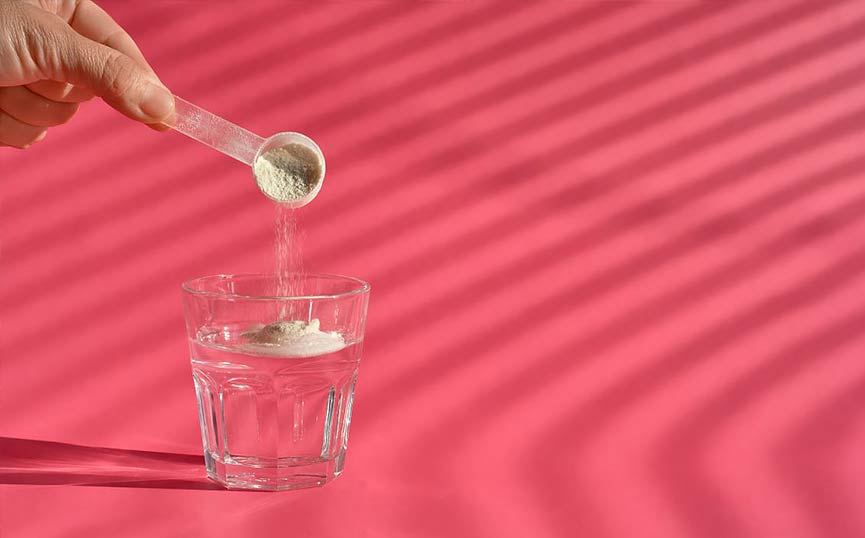All about collagen
Collagen has become one of the most used active ingredient in the beauty industry. It is used in creams and serums, but collagen tablets, powders, gummies and liquid formulas are also very popular. You can choose as you want, as there is a huge range of products.

But let's take a look at what collagen is, why everyone is talking about it and why is it so important if you want to keep your skin fresh and youthful?
WHAT IS COLLAGEN?
Collagen is a structural protein, the most abundant protein in the body. Collagen is the vital building block of our body. Mostly accumulated in the skin, teeth, joints, but also found in bones, connective tissue, muscles, etc. Collagen is responsible for skin tone, bone strength and joint flexibility. Contributes to hair and nail growth, but also supports intestinal function. These are several types of collagen known to be found in the body. Three of these are most common, and most are found in dietary supplements. Type I and III are mostly present in large quantities in the skin. Type II collagen is found mainly in cartilage and joints.
COLLAGEN AND SKIN
Most of the skin is made up of collagen and water. Type I collagen is the most important type of collagen for the skin, making up 80% of it's collagen content. It plays a very important role in the structure of the skin. Collagen is derived from a Greek word (kolla) meaning: glue. Together with elastin, proteins and other substances, it forms a so-called extracellular matrix, i.e. it participates in the construction of the space between cells. This network holds the skin and ensures its physical properties such as tone, elasticity and firmness. However, as we age (from 25 to 30 years), it steadily decreases, leading to a loss of skin firmness and elasticity.
COLLAGEN AND JOINTS
Collagen is a key component of both joints and ligaments. Delays joint problems and wear and tear by providing an oiling agent for cartilage. Joints contain the highest amount of type II collagen and ligaments contain type I collagen. Collagen is very important for maintaining strong, healthy joints. Not only in old age, but with serious physical activity, it can also be crucial when avoiding and treating injuries. Taking it helps to reduce inflammation in the body, such as arthritis or rheumatism.
WHAT AFFECTS COLLAGEN LEVELS?
As mentioned above, the body's collagen levels continue to decline from around the age of 25.
This means a loss of approximately 1-1,5% collagen per year. This is a natural process that comes with age. But this can be influenced and accelerated by many lifestyle factors.
Stress, lack of sleep, inadequate diet, too musch sugar and refined carbohydrate consumption, smoking, frequent alcohol consumption and harmful UV radiation, air pollution all negatively affect collagen levels. The saying that everything is written on our face is apt in this case, since the condition of our skin depends on our lifestyle and our lifestyle leaves it's mark on our face.

WHAT TO DO?
The age-related decline in collagen levels is a natural process, but you can do a lot to improve the condition of your skin and reduce the signs of ageing by making simple, everyday, conscious choices. Leaving harmful passions behind, getting enough quality sleep, avoiding excessive sun exposure and eating a balanced, healthy diet will all have a positive effect on the condition of your skin.
NUTRITION
The most important thing is to pay attention to adequate protein intake. Choose quality protein sources. We can get a significant amount of collagen mainly from animal products. It is found in meat products, especially poultry and fish, but eggs, jelly and broth are also super sources of collagen. In addition, milk, dairy products, legumes, nuts and oily seeds can also be excellent sources. Collagen synthesis requires vitamin C, but zinc and copper also help to promote collagen production, so you can support your body's collagen production by eating a variety of fruits, vegetables and whole grains. However, the importance of drinking enough water cannot be highlighted enough.
COLLAGEN SUPPLEMENTATION
You can already do a lot to keep your skin looking youthful by living a healthy lifestyle, and by taking supplements to boost your body's collagen production. However, it does matter which collagen you take. As mentioned above, there are many types, qualities and formats of collagen to choose from. Look for the hydrolysed form. This is important because collagen is a giant protein that is broken down into smaller units during digestion, which is how it gets into the skin and joints. If it is present in a hydrolyzed - i.e. broken - form in the product you choose, absorption and utilization will be more effective. Give preference to the unflavoured form, but if you do decide on a flavoured one, make sure that the product contains as few additives as possible.
TO LOOK OUT FOR
Vitamin C
When choosing a product, it is important to check that it contains vitamin C, because it greatly promotes the absorption of collagen, which makes the effect more beneficial.
Hialuronic acid
It is also good to know that hialuronic acid boosts the action of collagen, as it helps fight wrinkles and ageing, just like collagen. It helps restore skin firmness by binding water, thereby hydrating the skin. It also supports the body's collagen production and helps skin regeneration.
Although the body is able to produce collagen, this decreases with age, so it is worth supplementing with the right foods and dietary supplements in order to increase the body's collagen level. A well-choosen dietary supplement provides effective support for achieving your goals while maintaining a healthy and balanced lifestyle.

